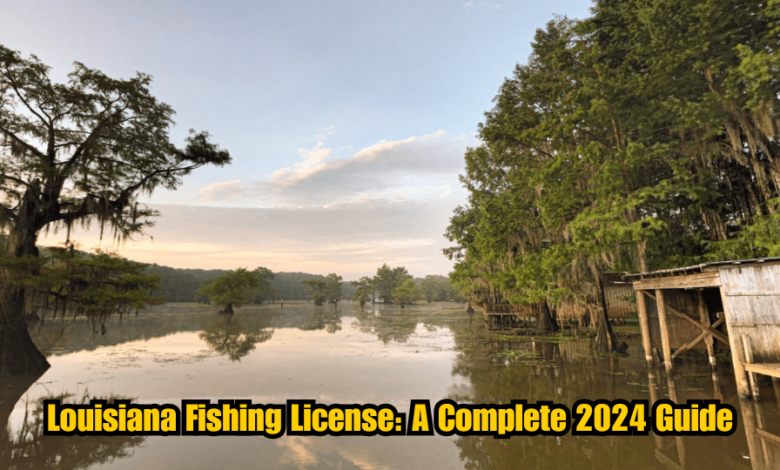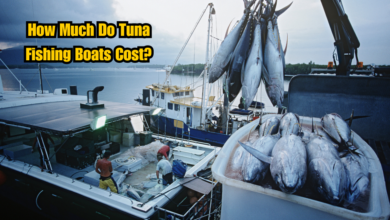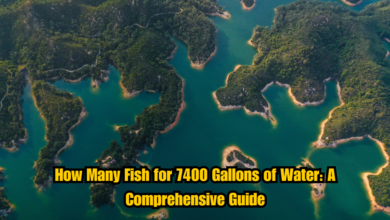Louisiana Fishing License: A Complete 2024 Guide

Fishing in Louisiana is more than just a pastime—it’s a way of life. With a rich tapestry of lakes, rivers, coastal areas, and the iconic Mississippi River Delta, Louisiana offers some of the most diverse and plentiful fishing opportunities in the United States. Before casting a line, however, it is essential to understand the requirements for obtaining a Louisiana fishing license in 2024.
Whether you’re a resident or a visitor to this “Sportsman’s Paradise,” knowing the rules for fishing licenses ensures compliance with local regulations and supports the preservation of Louisiana’s aquatic resources. In this guide, we provide comprehensive information on everything you need to know about getting a fishing license in Louisiana.
Visit Now – Louisiana Fishing License
Why Do You Need a Louisiana Fishing License?
Fishing licenses are a vital tool for sustaining fish populations and managing fishing activities. The revenue generated from fishing licenses contributes to the conservation efforts of the Louisiana Department of Wildlife and Fisheries (LDWF), ensuring that fish habitats remain healthy and that future generations can continue to enjoy the state’s rich aquatic life.
Fishing without a license not only jeopardizes Louisiana’s fishing resources but also comes with penalties, including hefty fines. Having the right license is a legal obligation that supports sustainable fishing practices.
Types of Louisiana Fishing Licenses
Louisiana offers various fishing licenses, catering to different groups of people. Here’s a detailed breakdown of the different types of licenses available in 2024:
1. Resident Fishing Licenses
Residents of Louisiana enjoy discounted rates on fishing licenses. To qualify as a resident, you must have lived in Louisiana for at least six months before applying for a license. Here are the main types of resident licenses:
- Basic Fishing License: This is the most common license and covers freshwater fishing across the state.
- Saltwater Fishing License: If you plan on fishing in the Gulf of Mexico or any saltwater areas, you will need this license in addition to the basic fishing license.
- Senior Fishing License: Available to residents aged 60 and above at a significantly reduced rate.
- Lifetime Fishing License: For those who want the convenience of never having to renew, a lifetime license is available and covers both freshwater and saltwater fishing.
2. Non-Resident Fishing Licenses
If you’re visiting Louisiana and plan on fishing, you’ll need a non-resident license. Non-residents are subject to different rates, but there are still plenty of options:
- Non-Resident Basic Fishing License: Grants access to freshwater fishing in Louisiana.
- Non-Resident Saltwater License: Just like residents, non-residents need this license for saltwater fishing.
- Short-Term Non-Resident License: Ideal for tourists, this license is available for 1 or 4 days, offering flexibility for visitors who don’t need an annual pass.
How to Apply for a Louisiana Fishing License
1. Online Application
One of the most convenient ways to purchase your Louisiana fishing license is online through the LDWF website. The process is quick and easy, and you can print your license immediately. Additionally, the LDWF mobile app allows anglers to purchase and store their licenses digitally.
2. Purchase in Person
If you prefer, you can also purchase a license in person at:
- Any LDWF offices.
- Local retailers like sporting goods stores, bait shops, and large retailers such as Walmart and Academy Sports.
3. Over the Phone
For those who prefer a more personal approach, the LDWF offers the option to purchase a license over the phone. The number can be found on their official website, and agents will guide you through the process.
Cost of Louisiana Fishing Licenses in 2024
Here’s a breakdown of the 2024 fishing license costs:
For Residents:
- Basic Fishing License: $9.50
- Saltwater Fishing License: $13
- Senior Fishing License: $5 (for those aged 60+)
- Lifetime Fishing License: $300
For Non-Residents:
- Basic Fishing License: $60
- Saltwater Fishing License: $30
- 1-Day Fishing License: $10
- 4-Day Fishing License: $24
Additional Fees
In some areas, special permits may be required for specific types of fishing, such as commercial fishing or fishing on designated wildlife management areas. Be sure to check whether you need any additional stamps or permits based on your chosen location and type of fishing.
Louisiana Fishing Regulations 2024
To fish legally and responsibly in Louisiana, it’s crucial to understand the fishing regulations that are in place to protect the ecosystem. Here are some of the main points to consider:
1. Catch Limits
Louisiana sets strict catch limits on various species to maintain fish populations. Some common catch limits for 2024 include:
- Bass: Limit of 10 per day, with a minimum length of 12 inches.
- Redfish: Limit of 5 per day, with a maximum size of 27 inches.
- Speckled Trout: Limit of 15 per day, with a size limit between 12 and 25 inches.
2. Seasons
Louisiana has seasonal restrictions for certain fish species. For example, shrimping and crabbing seasons are regulated to avoid overfishing. Saltwater fish, including Red Snapper, also have specific open and closed seasons. Always check the LDWF website for the latest updates before planning your trip.
3. Gear Restrictions
There are also gear restrictions in Louisiana to ensure that fishing methods don’t cause undue harm to fish populations. Trotlines, yo-yos, and nets are all regulated, with some being banned entirely in certain areas. Barbed hooks and gill nets are prohibited in protected zones.
Fishing in Louisiana’s Wildlife Management Areas
Louisiana’s Wildlife Management Areas (WMAs) provide some of the best fishing spots in the state. However, if you plan to fish in any of these areas, a WMA Access Permit is required. WMAs include habitats ranging from coastal marshlands to cypress swamps, offering anglers a variety of experiences.
Some popular WMAs include:
- Atchafalaya Delta WMA: Known for its vast estuaries and prime saltwater fishing.
- Sherburne WMA: A great spot for bass fishing in inland freshwater lakes.
- Maurepas Swamp WMA: Offering scenic fishing spots for freshwater species.
Fishing in WMAs often means you’ll be fishing in more remote and biodiverse areas, but it also requires a more specific understanding of local regulations. Ensure you have the necessary permits before your trip.
Fishing in National Parks and Federal Areas
Certain national parks and federal reserves in Louisiana also allow fishing. Jean Lafitte National Historical Park and Preserve is a famous destination where anglers can enjoy both freshwater and saltwater fishing. When fishing in these areas, be sure to review any additional rules or permits that may apply.
Penalties for Fishing Without a License in Louisiana
Fishing without a license in Louisiana can result in fines and penalties, especially if you are caught without the proper documentation. Here are the potential consequences:
- Fines: Fishing without a license could result in a fine ranging from $50 to $500, depending on the circumstances.
- Seizure of Equipment: In some cases, your fishing gear and boat may be confiscated if you are found violating fishing laws.
- Suspension of Fishing Rights: Repeated offenses can lead to a suspension of your fishing rights in Louisiana.
To avoid any legal complications, always ensure you have your fishing license on hand and that it is valid for the area where you are fishing.
Tips for Fishing in Louisiana
Here are some essential tips to make your Louisiana fishing experience even more enjoyable:
- Check the Weather: Louisiana’s weather can change rapidly, especially during hurricane season. Always check local forecasts before heading out on a fishing trip.
- Use Local Bait: Using live bait caught locally is often more effective when targeting species like redfish or bass.
- Respect Private Property: Many of the best fishing spots are located on private land. Always ask for permission before fishing on private property.
- Follow Size and Bag Limits: Adhering to size and bag limits ensures that fish populations remain healthy for future anglers.
Conclusion: Supporting Louisiana’s Fishing Future
Obtaining a Louisiana fishing license is a simple and necessary step to support the state’s conservation efforts. By purchasing a license, you contribute to the preservation of Louisiana’s waterways, ensuring that fishing remains a beloved tradition for years to come.
With the various options for both residents and non-residents, there’s a license for everyone who wants to enjoy Louisiana’s bountiful waters. Whether you’re planning to fish in saltwater or freshwater, be sure to follow the rules and regulations to protect the state’s fishing resources and keep the Sportsman’s Paradise thriving.
For more information on Louisiana fishing licenses or to make a purchase, visit the Louisiana Department of Wildlife and Fisheries official website.




